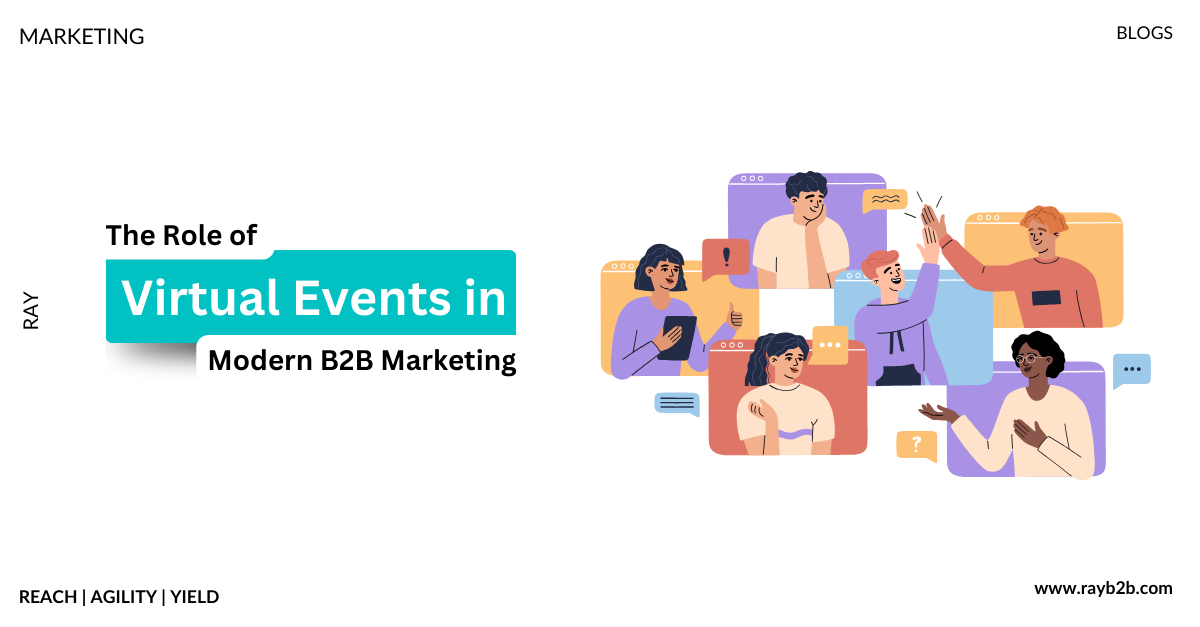
In the fast-paced world of business-to-business (B2B) marketing, adaptability and innovation are key.
As companies seek more effective ways to reach and engage their target audiences, virtual events have become a game-changer in the digital era.
With advancements in technology and shifting consumer behaviors, virtual events have grown increasingly important in B2B marketing. They offer unique opportunities for businesses to connect, educate, and convert prospects into loyal customers.
In this blog, we explore the transformative impact of virtual events and their indispensability in modern B2B marketing strategies.
Accessibility and Reach
One of the most compelling advantages of virtual events is their unparalleled accessibility.
Unlike traditional in-person events limited by geographical and logistical constraints, virtual events transcend borders, enabling businesses to reach a global audience effortlessly. This expanded reach allows B2B marketers to connect with prospects and clients from diverse regions without incurring significant travel or venue expenses.
For instance, an American software company can now easily engage potential clients from Europe, Asia, or Africa without the need for international travel. This global accessibility maximizes attendance and engagement, enhancing brand exposure and creating vast lead generation opportunities. Virtual events remove participation barriers, allowing potential customers to join from their homes or offices, making attendance easier and more convenient.
Cost-Effectiveness
In an era where cost efficiency is crucial, virtual events provide a budget-friendly alternative to traditional marketing channels.
Leveraging digital platforms and online collaboration tools, businesses can host immersive and interactive events at a fraction of the cost of physical gatherings. From reduced venue expenses to lower staffing and travel costs, virtual events allow B2B marketers to allocate resources more strategically, achieving maximum ROI while maintaining high levels of engagement and impact.
For example, a virtual conference that might cost a fraction of an in-person one can still offer high-quality content and networking opportunities. This budget efficiency enables businesses to reinvest savings into other critical areas, such as enhanced marketing campaigns or product development, further driving growth and competitiveness.
Data-Driven Insights
A key advantage of virtual events is their ability to offer rich data and analytics.
Through advanced tracking mechanisms and attendee engagement metrics, B2B marketers gain valuable insights into participant behavior, interests, and preferences. Analyzing this data allows businesses to tailor their marketing strategies and content to better resonate with their target audience, driving higher conversion rates and customer satisfaction.
For instance, by monitoring webinar attendance, session interactions, and survey responses, marketers can identify which topics generated the most interest and engagement. This actionable intelligence enables them to refine future events and marketing materials, optimizing their approach to meet the specific needs and interests of their audience.
Enhanced Networking Opportunities
Despite the lack of face-to-face interactions, virtual events offer robust networking opportunities for B2B marketers.
Features such as live chat, Q&A sessions, and virtual exhibitor booths enable participants to engage with industry experts, peers, and potential clients in real-time, fostering meaningful connections and partnerships. Facilitating networking in a digital environment breaks down barriers and creates a level playing field for attendees, regardless of their location or organizational size.
For example, a small startup can have the same access to industry leaders and potential clients as a large corporation, democratizing networking opportunities. These digital interactions can lead to significant business opportunities and collaborations that might not have been possible otherwise.
Content Personalization and Engagement
Virtual events empower B2B marketers to deliver highly targeted and personalized content to their audience.
Through interactive presentations, live demos, and on-demand resources, businesses can cater to the specific needs and interests of their prospects, driving deeper engagement and brand loyalty. Tailoring content delivery based on attendee preferences and behavior helps create memorable and impactful experiences that resonate long after the event concludes.
For instance, a virtual event platform might offer personalized agendas, allowing attendees to select sessions that align with their interests. Additionally, virtual breakout sessions and personalized follow-up emails can reinforce key messages and maintain engagement, ultimately driving higher conversion rates and customer loyalty.
Adaptability and Scalability
In today’s dynamic business environment, agility and scalability are essential for success. Virtual events offer unparalleled flexibility, allowing businesses to adapt quickly to changing market conditions and customer preferences.
Whether hosting a small webinar for a niche audience or a large-scale virtual conference with thousands of attendees, B2B marketers can scale their events seamlessly to meet evolving business needs. Furthermore, virtual events can easily accommodate last-minute changes or additions, ensuring a smooth and hassle-free experience for both organizers and participants.
For example, if market trends shift, a virtual event can quickly incorporate new topics or speakers to address these changes, providing timely and relevant content to attendees. This flexibility ensures that businesses remain agile and responsive to the ever-changing business landscape.
Sustainability and Environmental Impact
As sustainability becomes increasingly important for businesses worldwide, virtual events provide an eco-friendly alternative to traditional in-person gatherings.
By eliminating the need for travel and reducing carbon emissions associated with venue operations, virtual events help businesses minimize their environmental footprint and contribute to a more sustainable future. Additionally, virtual events require fewer resources and generate less waste compared to physical counterparts, making them a greener option for environmentally conscious organizations.
For example, a virtual event can significantly reduce the carbon footprint of attendees who would otherwise need to fly in from various locations. This reduction in travel not only lowers emissions but also aligns with the growing demand for corporate social responsibility and sustainable practices.
Conclusion
Virtual events have revolutionized the landscape of modern B2B marketing, offering unparalleled opportunities for businesses to connect, engage, and convert prospects into loyal customers.
From accessibility and cost-effectiveness to data-driven insights and enhanced networking opportunities, virtual events provide myriad benefits for marketers looking to stay ahead in today’s digital era. By embracing virtual events as a core component of their marketing strategy, businesses can unlock new growth opportunities, drive meaningful connections, and achieve lasting success in the competitive B2B marketplace.







